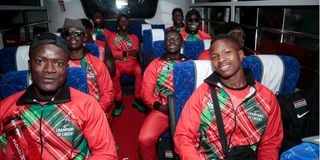Making Olympic Games list is clear, well-defined with no room for idlers

Kenya Sevens Rugby players before the team departed for France on July 8, 2024 for the Paris Olympics Games.
The public is demanding the list of the official Kenyan delegation to the Paris Olympics!
This is perhaps the hottest topic around the Games in the country at the moment. For a long time, sports administrators have had to grapple with who should be in the Olympic delegations with so many people interested in travelling. Who would not want to be at the Olympics?
The public interest in the Olympic delegation is a welcome and constructive way to promote transparency and accountability. This should further bring national pride and overall development of sports in the country. It is indeed a very positive civic engagement.
NOC-K subscribes to the recent focus to fix the country.
We have in the last few years been trying our best to fix sports within the Olympic and Commonwealth movement. We are not yet where we should be but we are very clear about our intentions and committed to staying on course. The latest developments in the country have just strengthened our resolve and conviction.
The huge wave of “everyone” wishing to attend the Olympics has been considerably lessened thanks to the public spotlight on the event.
While it is important to understand the Olympics and maintain the sanctity of the space, we want Team Kenya to operate at optimal level.
Athletes are at the centre of the Olympics. Our athletes will be among an elite world group who will have the lifetime opportunity to participate in the Olympics. Paris 2024 Olympics will have 10,500 athletes.
Athletes representing Kenya have earned their stripes. They qualified through world rankings or continental championships. Swimming is the only sport in which the athletes qualified via the Universality criteria. Even with this opportunity, the two swimmers selected earned their position by having the highest World Aquatics points in Kenya.
Surrounding these Olympic-bound athletes is an entire system to ensure the best environment for them at the highest level of competition.
There are about 80,000 people working for the Olympics as support staff including 45,000 volunteers and journalists.
The primary team officials are the ones at closest proximity to the athlete. These include coaches, physiotherapists, doctors, team managers, strength and conditioning coaches and nutritionists.
Others are sports scientists, sports psychologists, data analysts and any other emerging specialist in the elite sports level.
Do not forget the Chef De Mission, Chief Medical Officer, Media Liaison and their equivalent such as the Chief Executive Officer, General Team Manager, Safe Guarding Officers, Chaperon and their deputies, depending on the delegation size as stipulated under the International Olympic Committee Quota system.
The additional team officials include administrators in various spheres such as managing entries, accreditation, hospitality, competitions and sports entries, travel, ground logistics, and Olympic ceremonies.
Functional areas
The Olympics is administered through functional areas. This is to ensure efficiency and effectiveness of delivery of the Games. The number of people involved and the geographical spread of the operation area must be complimented sufficiently by the support personnel.
Kenya participates in the Olympics courtesy of the NOC-K, one among the 206 that make up the International Olympic Committee (IOC).
The Olympic family is a special category of those who attend the Games. These will include IOC members, Olympic committee presidents, secretary generals and international federations heads amongst others.
Whereas the Olympic movement runs independently, it also has a very strong principle of collaboration with governments. Dignitaries’ category of accreditation is for the Head of State, Head of Government, Minister of Sports and the Ambassador of the participating country.
Depending on the hierarchy this accreditation can allow for security and assistant.
The last category of relevance to Kenya is media accreditation. There are different levels of media accredited. Independent media houses apply for their accreditation.
Based on the team size of each country and the previous Olympics’ media participation, the IOC allocates a quota for each country. This time round IOC has created an accreditation category for media staff working within the National Olympic Committees across the world.
Anyone outside these well-defined allocations and roles within the Olympic structure purchase their tickets to watch the Games.
Sends invitations
The National Olympic Committee formally sends invitations to interested parties on request or by formality. The condition is strongly that they cover all their expenses as they travel to support Team Kenya. Perhaps under the new dispensation that should be the opening paragraph.
Qualification to Olympics ended on June 30. The week after was dedicated for entries to be confirmed. This entailed data entry of each athlete’s specific event in the Olympic system. This was followed by confirmation of the final team size for each country, that is, the athletes plus the corresponding number of support staff. This has now been done for Team Kenya.
The next stage is confirmation of the supporting team to the Olympics. NOC-K is required to present the proposed Team Kenya composition to the Preparatory and Management Committee as established and guided by a published Government Gazette notice. This is important as the Committee is charged with oversight of the participation, team size and budget which are approved at that level.
I believe this will be done this coming week.
The current heightened focus on Kenya’s Olympic list is a real blessing in that it ensures the athlete remains at the centre of all arrangements.
Mutuku is Secretary General of NOC-K. [email protected]




